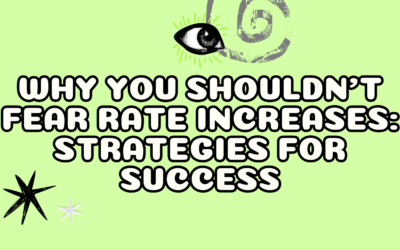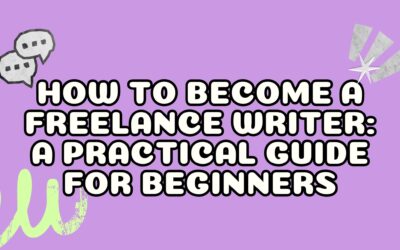The biggest struggle freelancers face is landing a steady stream of clients every single month.
There’s a reason the freelance life is often described as a cycle of feast and famine – and the reasons ain’t good.
But here’s the thing:
A lot of freelancers condemn themselves to a life of scraping by, scrounging together whatever money they can from month to month because that’s what we’re told freelancing involves from the films and TV.
Freelancers drink whiskey at midday.
Freelancers are only freelancing because they can’t get a real job.
Freelancers are lazy.
Freelancers are always poor.
You get the gist.

While the whole “working for yourself” lifestyle is coveted by pretty much the world and her dog, people still have these negative connotations of it.
But hey, listen!
Freelancing doesn’t have to be feast and famine.
It is possible to get a steady stream of amazing, well-paying, lovely, awesome clients every single month. I can say this with conviction because I’m doing it right now.
I don’t have to send out cold pitches to companies any more. I don’t have to watch my money each month so I have enough left over to pay the bills. I don’t get that mid-month panic that I’ve got nothing lined up work-wise after the next two weeks.
But it didn’t just happen like that *clicks fingers*.
There was one thing I persistently worked on so that I didn’t have to worry about where my next paycheck was coming from.
That thing was my online presence.
Sure, I’ve got a website, and I hang around a little bit on some social media channels, but that’s not all I mean when I say “online presence”. In fact, there are so many different ingredients that can go into building up your presence and helping you to stand out in your industry.
The other day I started to list them out and the list just kept getting longer and longer. Here we are now, with more than 30 ideas for building your online presence as a freelancer and getting that edge over your competition.
How to Build Your Online Presence as a Freelancer
1. Know Your Niche
If you want a sandwich you go to Subway.
If you need a family lawyer, you find a lawyer who specialises in family law. It’s as simple as that, and this is no different for freelancers.
The more focused you are on who you serve and what industry you’re working in, the more likely you are to boost your positioning in that industry and become the go-to person for whatever it is you do.
2. Know Who You’re Targeting
Just like it’s important to know your niche, it’s also important to know exactly who you want to reach (a.k.a. what kind of clients you want to work for).
The better you know your prospects, the better you can serve them and the more you will boost your online presence.
3. Create Top-Notch Blog Posts
Blog posts are one of the key ways new prospects will find you and your site, whether they arrive there through a Google search, by social media, or another way.
If you’re constantly creating top-notch and super-valuable posts, you’re going to become known for that. What’s more, these people will start expecting great things from you, continue to come back for more and, perhaps most importantly, share your with their friends and colleagues.
4. Get Creative With Instagram Stories
Creating personal connections with prospects strengthens your relationship with them and starts to build trust.
As a freelancer, showing that you’re human is important – you’d be amazed at the amount of times I’ve landed a project with my shining personality (har har) which I happily showcase on my website and social media.
Instagram Stories are the perfect place to show off behind the scenes stuff and to build that personal connection.
Freelance letter artist Stefan Kunz uses Instagram Stories to share workshop dates and other fun things about his work.

5. Use Instagram Hashtags
Part of building your online presence is building your visibility, and the easiest place to do this is on social media. Hashtags give you a chance to get your stuff in front of people who aren’t necessarily following you, but who are interested in a certain topic.
6. Participate in Facebook Groups
Just like hashtags can get you seen on social media in circles where you ideal clients might be hanging, so too can Facebook Groups. These tend to be more community-driven affairs, where you can chat with peers and get your name out there.
7. Get Involved in Podcasts (or Start Your Own!)
Chances are, you’ve listened to a podcast or two (or three, or four..!). They’re all the rage at the moment and are actually a great way to show off your expertise to a rapt audience.
Think about it:
Podcasts can be so much more personal than a blog post because listeners can actually hear your voice. Getting featured or interviewed on podcasts in your niche really helps get your name out there but, if you’re feeling brave, you can always start your own.
8. Publish Round Up Posts
Ever heard the saying “it’s not what you know, it’s who you know”?
This rings so true when you’re trying to build an online presence.
Building connections with key influencers in your niche is a surefire way to get yourself on their radar and opening relationships with them so that, in the future, they might share a good word or two about you to their audiences.
A simple way of introducing yourself to influencers is to give them something in the process. This could be an inclusion in one of your round-up posts (you know, a topic like “23 Experts Share Their Top Instagram Tips” or “How 21 Freelancers Found Their First Client”).
You can then reach out to the influencers you’d like to include with your roundup post and encourage them to share it on social, through their newsletter, or another way.
9. Start Collaborating
Two minds are better than one (I’m full of alllll the sayings today!).
Join forces with another freelancer or small business owner on a collaborative endeavour that exposes both of you to the other’s audience. For example, you might go halfsies on a blog post, you might run a webinar together, or you might swap tips in each other’s Facebook Groups.
10. Create Stand-Out Branding
You shouldn’t judge a book by its cover, but it’s a cruel fact of life that people do judge businesses by their branding – well, at least a little bit, anyway.
Your branding (like your logo, colours, fonts, social media graphics etc) is what’s going to be the first thing new prospects see, and it’s also going to be one of the key ways they remember you in the future. A wishy-washy brand with no defining features will quickly be forgotten in favour of something eye-catching and memorable.

Designer Rob Fenech has his branding down, complete with cartoon ninjas.
11. Film Videos
YouTube is the second biggest search engine in the world, which means you have access to millions of people on that platform. The problem is, not many people actively film videos and post to a strict schedule on there.
This leaves tons of room for you to swoop in as the expert on your topic and start creating valuable videos. What’s more, people today soak up information in visual format better than in text, so they’re likely to remember who you are.
12. Run Webinars
Putting your face on camera is a terrifying prospect – especially live, when you don’t have the safety of editing to get rid of all those embarrassing “uhms” and “ahhs”, but it really is a fantastic way to boost your online presence.
Webinars are in-the-moment lessons that let you speak directly to your audience about the topic you’re an expert in.
Not only does this create a personal connection (because they can actually see and hear you, which is so underrated in the digital age), but the fact that you’re teaching something automatically puts you in the position of authority on what it is you’re talking about.
This is also a great way to build your email list, because people are highly likely to sign up for a completely free, live training on a pain point they have (seriously, I’ve watched webinars I would happily have spent hundreds of pounds on watching).
13. Host Seminars or Workshops
I know we’re talking about your online presence here, but that doesn’t mean you can’t work your magic offline and see the fruits of your labour unfold in the digital world.
Seminars are intimate, in-person events that let you build a really solid connection with your attendees. The best part about this kind of marketing is that the people who show up are so much more likely to recommend you to their peers, colleagues, and friends than someone who’s just stumbled across you online.
We underestimate the power of real-life connections today, but they are still an incredibly important part of growing a business.
14. Go Networking
If you’re anything like me, the thought of spending an evening talking to strangers about what you do is a nightmare.
However, I’ve begrudgingly learnt that networking is so important as a freelancer, not just for meeting clients, but for meeting fellow freelancers too who will refer work to me.
In fact, I’ve had a number of projects land in my inbox that have been referrals from people I’ve met just once at a networking event.
Not only does this get your name out there in the freelancing world (because we’re more likely to remember someone we’ve met in person than online, right?), but it’s also a great way to land new clients – double whammy!
15. Attend Conferences
Conferences are an extension of the in-person networking idea (and you also get to learn stuff too, while you’re at it).
These are concentrated places packed full of other like-minded people, and there are two options here.
Firstly, you can attend conferences geared towards your ideal client and become known for being the expert at X in those circles, or you can attend conferences aimed at fellow freelancers who can refer work to you as the expert at X.
Or, better still, attend both if you’ve got the funds and the time.
16. Twitter Chats
I rarely attend Twitter chats these days, but I used to schedule them into my diary to make sure I attended every week.
Not only do they give you a chance to network with other relevant people, but you’ll also start to get recognised if you show up consistently. Even better, you can use this as a space to share your expertise and skill (just make sure your Twitter profile is up to scratch first in case people are curious and want to find out more about you).
17. LinkedIn Statuses
LinkedIn statuses seem to have more clout that Facebook or Twitter updates because it is a professional platform.
Each status kind of acts like a mini blog post and gives you the chance to put your expertise in front of relevant prospects and freelancers.
The best part is that LinkedIn users are more likely to be thinking about work when they’re on the platform than when they’re browsing other social media sites, so they’ll be receptive and in the right frame of mind to absorb your knowledge.
18. Go Live
It’s really hard to make connections in the digital age, so by showing even just a tiny bit of human-ness can go a long way.
One of the best ways to do this is by going “live” (either on Facebook or Instagram). This gives your followers a chance to connect with you as a person and it feels a lot more intimate than a blog post or a simple status update, which makes it easier for people to feel closer to you.
19. Carry Out Interviews
Interviews are a great way to expose your business to new audiences. On the one hand, you can answer interview questions for other bloggers, influencers, or freelancers for a chance to connect with their audience.
On the other side, you can carry out interviews yourself with people you admire. They are then likely to share their interviews with their audiences (because who doesn’t like sharing stuff about themselves?!) and open you up to a new segment of people.
20. Guest Blogging
Similarly, guest blogging gives you access to new audiences.
There are two ways you can do this.
Firstly, you can go broad and blog for generic, big-name publications that have large audiences in the hopes that at least a few people will resonate with what you’re saying and want to find out more.
Secondly, you can niche down and guest blog on super-focused publications in your niche. At least then you know that the readers and interested in what you’re putting out there, which means it’ll be far easier to convert them to readers (and customers) of your site.
21. Off-Platform Blogging
Guest blogging takes some time to get traction, but in the meantime you can write for dedicated blogging sites like Medium which has a huge audience.

The best part is, Medium has thousands of different publications you can enter your pieces to, many of which have highly-focused and large readerships.
22. Lead Magnets
“Huh?”, you say. “What the heck is a lead magnet?”
These are the free downloads you see on sites that ask for your email address in exchange.
These valuable pieces of content give you the chance to show off your expertise to readers and potential customers while growing your email list (who you can then send more content to down the line).
In fact, here’s a lead magnet:
23. Have a Specialist Skill
It’s far easier to become known for one thing than to try and become known for many things. Ideally, you want people to think of you first when they need a finance writer, or a bakery designer, or a watercolour florist, or whatever it is you do.
You can grow your online presence much quicker if you niche down rather than try and become known as just a writer, designer, or florist.
24. Optimise Your Website
According to research, only 51% of small businesses have a website. That number seems ridiculously low when you consider that 97% of consumers search for products and services online.
You want a slice of that search action, right?
Assuming you have a website (which, let’s face it, you really, really should), you also need to optimise it to reflect your expertise and the service you want to become known for.
Want to be a vintage sign writer for hipster breweries? Make sure you have that written all over your website. Likewise if you want to write data reports for high-brow technology companies.
You get the idea.
25. SEO
Just like you need to tell people what you’re all about when they land on your website, you also need to get them to your website in the first place.
This means search engine optimisation (a.k.a. SEO).
Pick out keywords that relate to your business and that people will be using to search for your services and inject them throughout your site.
26. Share Amazing Content
Social media is a great place to make connections and share your expertise, but if you’re constantly pushing your own stuff people are going to get bored and think you’re spammy.
Instead, share amazing content by other people, too.
Not only will this help you connect with those people, but it’ll show your audience you really care about certain topics regardless of if you’ve written about them or not.

27. Engage With Colleagues
It’s a lonely climb to the top, but it doesn’t have to be.
One of the best ways to boost your online presence is to collaborate, network, and connect with others in your industry. They don’t have to be influencers or well-known people, it can be anyone. You never know who might recommend you to their own followers or clients, and every little boost like this helps.
28. Teach
There’s nothing like cementing yourself as an expert in your industry than teaching something you’re knowledgeable about. The teacher-student dynamic automatically creates a sense of awe and increases the chances of students referring their friends and colleagues to you.
You can teach things like workshops and webinars, or share tutorials by video or through email – there are plenty of non-traditional ways you can “teach” that mean you don’t have to sit in a stuffy classroom.
29. Expand Your Services to Include Products
You’ll probably start by having a couple of services that you offer, but to grow your online presence, you might want to branch away from that.
Releasing a few products, like ebooks, course, live workshops, t-shirts, or something else can give you the chance to reach a new audience while making a nice little chunk of passive income.
30. Write Case Studies
Case studies are a great way to show the results you can get and give your audience a taster of what you can do. These don’t have to be lengthy books or really detailed with tons of numbers, they can just be a one-pager that outlines a challenge you solved and the results you achieved for past clients or customers.
31. Run an Experiment
There’s something fascinating about reading a story from someone who’s run an experiment. Not only does this provide you with completely unique content, but it also shows off your skills and solidifies your expertise.
An experiment might include something like testing out different email subject lines if you’re a marketer and writing up your findings or changing the way you do something for a month and documenting how it goes.
32. Email Marketing
Regularly showing up in the inboxes of your audience is a great reminder that you’re a constant source of knowledge on your particular topic.
Inboxes are sacred places and every email you send strengthens the connection and trust between you and your subscribers. They’ll soon come to know you as the go-to person in your industry and will look forward to opening your emails.
Your Online Presence is a Huge Factor in Your Success
My business has grown exponentially since I started putting in the effort to grow my online presence. Now, I don’t have to cold pitch to prospects. Instead, I have prospects come to me through my website and other avenues were I’ve built up my profile.
The more presence you have online, the more likely prospects are to find you and the bigger your audience will be. That equals more referrals, more work, and more revenue – it’s win-win.






Wonderful article Thanks.